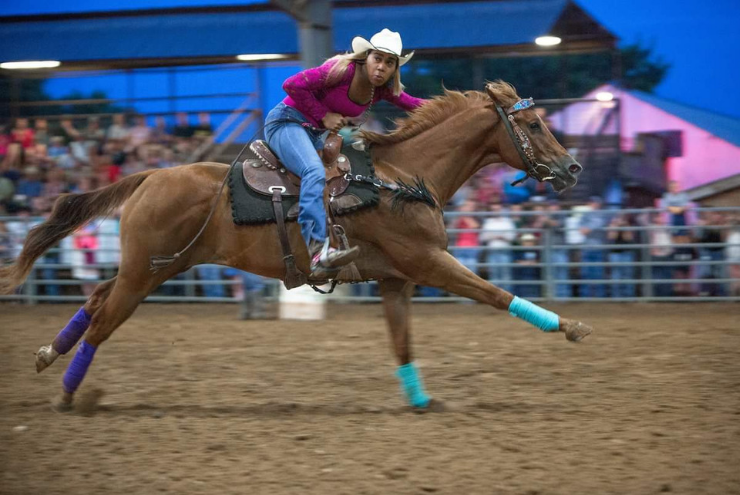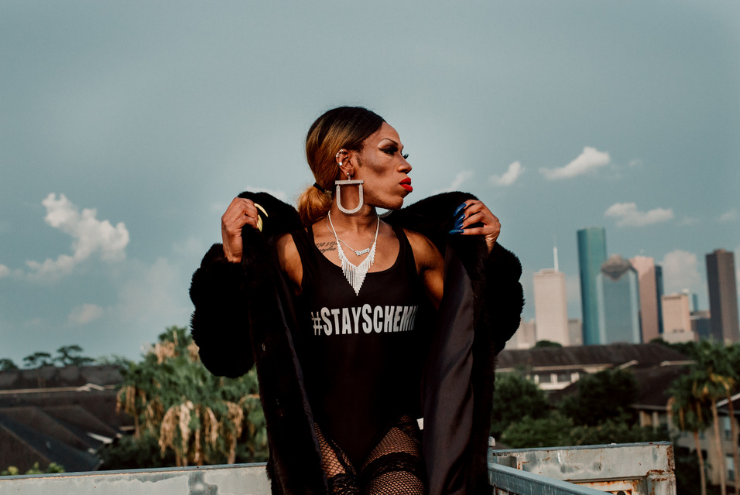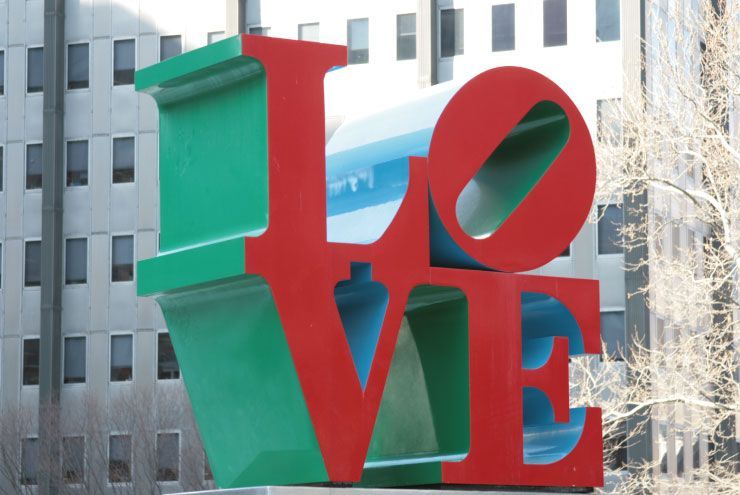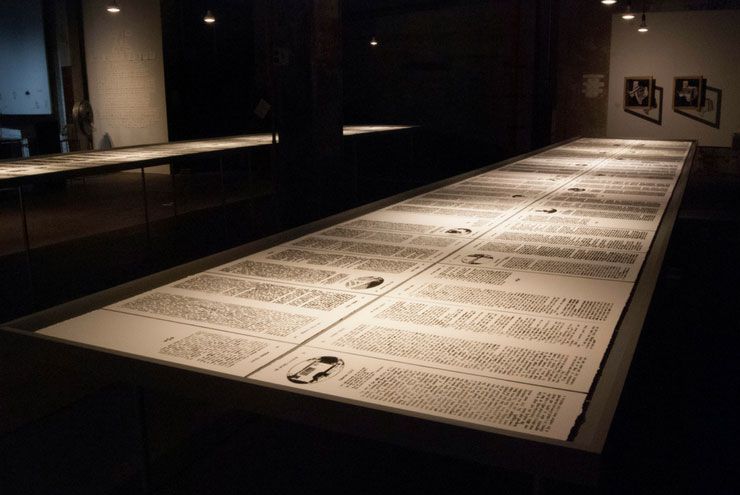By Kelsey Gledhill
“I’m always on my way to a rodeo,” says Arqueze Girdy. “Today, it’s Liberty.” The 27-year-old barrel racer graciously made time to meet me while traveling to east Texas for the next stop on her jam-packed weekend rodeo circuit. We hoist ourselves into the front seat of her Dodge dually pickup truck—which, by the way, is hooked to a 20-foot aluminum trailer carrying her beloved competition horses—and quickly dive into conversation. Her delicate voice is grounded in a steady, welcoming tone that somehow seems to soften the rumbling of the truck’s diesel engine. I focus in on her quiet confidence and passion—both of which, as I would later learn, have been questioned and tested time and again.
You may recognize the determined rodeo competitor from local news coverage this past January when it was reported that she was excluded from competing in the first annual MLK Scholarship Rodeo and Trail Ride in Rosenberg, Texas, due to her identity as a trans woman. Although the event’s promoters claimed that Girdy was unable to compete because she had not provided proper documentation, she and others know this was more than a formality issue. The real problem extends beyond paperwork and is unfortunately rooted in transphobia—not only within the rodeo community, she says, but the Black community as well.
In our one-on-one conversation, Girdy loosens the reins and sheds light on this unfortunate incident, as well as on her experiences within the rodeo industry, quest to be the first Black barrel racer to compete in the Wrangler National Finals Rodeo (WNFR), finding unexpected support from her hometown football team, and navigating day-to-day life as a trans woman of color.
Kelsey Gledhill: Do you mind sharing how you identify and your current city? Did you grow up there? How would you describe the climate there for queer and trans folks?
Arqueze Girdy: I identify as a straight female and currently live in Victoria, just south of Houston. Although it’s where I spent most of my childhood and adulthood, I don’t care for it too much because there’s not a lot going on. Just like any other town or city, queer folks exist, but Victoria’s community is very small and quiet—you don’t really know who’s out and who’s not. I mostly keep to myself by going to the barn, riding, and then back home.
You seem to eat, breathe, and sleep rodeo—can you describe how you found the sport?
Most of my family currently rodeos or has in the past. My mother was a barrel racer, as well as my sister, and my father was an all-around cowboy, competing in multiple events, including tie-down roping, team roping, and bull riding. I also have several aunts, uncles, and cousins who enjoy competing. The love for the sport definitely stemmed from my family, who has always supported my dream to become a barrel racer—I know I wouldn’t have been able to come as far as I have without them.
Rodeo is a tough sport. It not only requires tremendous physical preparedness by you and your horse, your mental game has to be there too. Then there’s the industry side of rodeo—it’s a multi-million-dollar business that absolutely has the ability to make or break you. What keeps you motivated to compete and what are your goals within the rodeo world?
It’s absolutely one of the most challenging industries out there. It takes a certain level of determination and grit, in all aspects, to not only compete, but to be successful. Beyond having talent, it takes money to make money in this sport. When you start totaling up what’s required from your checkbook to compete—like the initial purchase of a competition horse, horse feed and veterinary care, rodeo entry fees, fuel costs, traveling expenses, stall rentals, and more—it adds up to a pretty hefty bill pretty fast. If you don’t win or place high enough in your event, then you don’t get a payout, which can affect your livelihood in and out of the arena. Many rodeo competitors seek sponsors in order to help them cover costs. I’m trying to do that as well, as there are many times that I don’t eat just so I can make it to the next rodeo. Sometimes I make peanut butter and jelly sandwiches or eat a Cup Noodles to save what I can.
It’s tough to find success on the rodeo trail no matter who you are, but it can be even harder for people of color to rise to the next level in an industry mostly dominated by white men. Not very many Black folks, especially Black women, make it to the professional realm of competition. I know several Black women who should and need to be competing professionally, but have a difficult time making it work due to family obligations, job restrictions and constraints, and/or simply just lacking the funds. I want to break that mold. I want to level up. I currently have my Cowboys Professional Rodeo Association (CPRA) card, which allows me to compete on the higher level amateur circuit. However, once I make it to the CPRA finals, I would like to gain my Professional Rodeo Cowboy’s Association (PRCA) card, which would allow me to compete professionally in the highest level of the sport. My ultimate goal is to be the first Black female barrel racer to qualify for the NFR—the Super Bowl of rodeo.
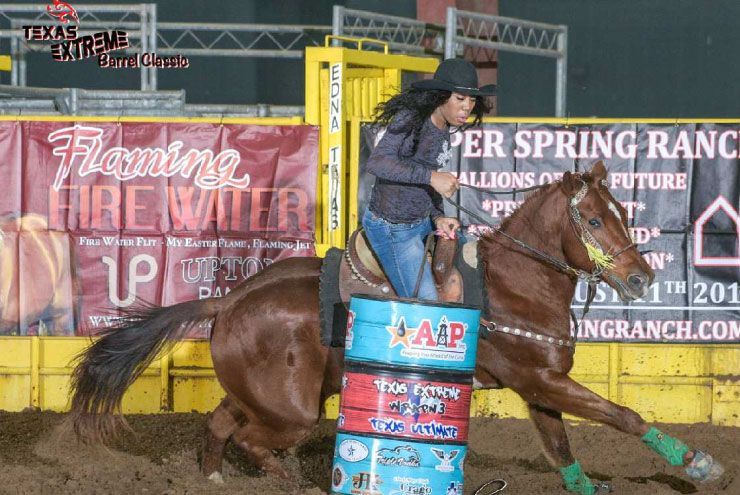
“I have a lot of young girls that look up to me and it’s important that I set a positive example for them.” -Arqueze Girdy
Take me through your coming out journey and how your identity has evolved along the way. How was coming out to yourself, your friends, your family, and your teachers?
Growing up, I never heard the word or knew the meaning of “transgender,” but in my mind, I was always a woman. Because I never knowingly saw anyone who was “queer” or heard anyone speak the words “gay” or “trans,” I didn’t really have that terminology to identify with.
I enjoyed watching WWF when I was younger, so my grandmother bought me a wrestling game for my Nintendo 64 one year. I would create players and dress them as girls because that’s what I wanted to see. My grandma would also buy me those horse and rodeo sets. I would never even look at the cows, or ropes, or cowboys—I would put my female wrestling toys on the horses, then take the cardboard cylinders from tissue paper rolls and set them up as barrels. That’s how I expressed myself; those were my outlets. As far as physical appearance, I loved to paint my nails and wear my hair in high ponytails just so it could fly in the wind any time I’d ride my horses.
The first person in my family to really accept me was my father. I think he just knew deep down who I was. My grandmother was upset at first, because although I’d always expressed myself more femininely, she thought I was lying to her in some way—she eventually came around though. However, my mother had a very difficult time understanding, which ultimately put a significant strain on our relationship. We’d go weeks without talking or seeing one another. That was an extremely hard time for me because I looked up to her so many ways, she was and is my everything, and to see her respond to me so negatively was devastating. I believe it was my relationship with my dad, however, that gave her the ability to understand me better. We have since reconciled and are now in a really great place.
As far as school goes, seventh and eighth grade was an interesting time for me. I had a core group of girls I ran with, and most of the students were okay with me, but I can’t say the same for the teaching staff. I think they just didn’t know how to treat my expressiveness. I loved to wear cute Bermuda shorts or skinny jeans with a cute top and padded bra, but I was definitely stuck in between a tomboy Aaliyah/Lisa “Left Eye” Lopes and just a confused little boy. One of the most vivid memories I have of school was an incident that happened while I was in seventh grade. Once a year, the school had a “celebrity day” where students were encouraged to dress up as their favorite celebrity. My friend group decided that we’d come as Destiny’s Child. We met in the bathroom that morning to put on our dresses, heels, and wigs, but when we exited, two Black teachers stopped us immediately. They told me, “No, nuh-uh,” then pinned me against the wall, took off my wig, and made me give them my heels. It rocked me. I tried to take my own life the very next day.
After that experience, I began to skip school frequently. I would go to the horse barn or go hide out under the bleachers at school because I knew it was a safe place. Sometimes I would sit in my closet and wait until my grandmother left for work—anything I could do to avoid being at school. It was just a bad time. Acceptance, whether in school, at home, or in the rodeo arena, was hard to come by. Surprisingly though, I found support from the most unexpected people—the football team. They really took care of me and treated me like a sister, calling me when I was down or feeling low and letting me help out at practices and games. If it wasn’t for them, I’m not sure if I would’ve made it.
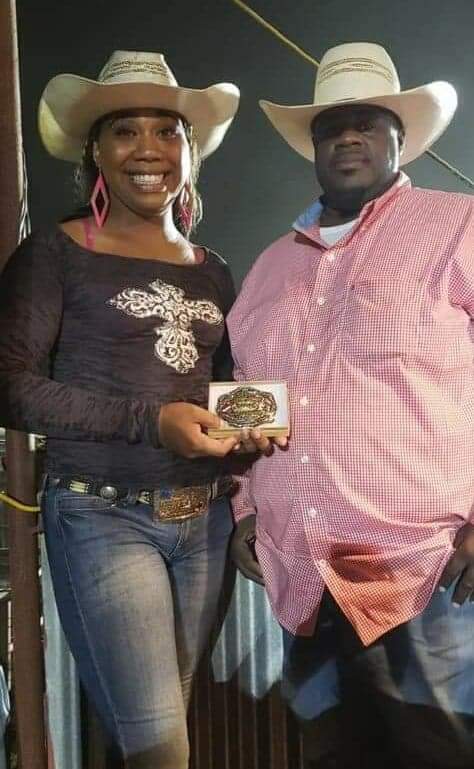
Arqueze Girdy (l)
The concept of rodeo is definitely unique and seen, to most, as a daredevil sport. I’d say “bold” is an appropriate term to describe the sport and anyone who participates. However, the people within the rodeo world tend to be more conservative in their views. How do you reconcile/navigate your identity as a trans woman of color in such a traditional institution?
You’re right, rodeo is definitely a daredevilish sport, yet conservative in spirit. In the beginning I did so much to try to fit in. Whatever other girls were doing, whether it was being loud and dramatic or just all-around extra, I would do the same. But now, in the past three to four years, I’ve changed my attitude and redirected my energy. I’m more reserved and focused, which I’m sure a lot of that has to do with just growing up and aging, but I’ve learned that less is best. What’s more, I also have a lot of young girls that look up to me and it’s important that I set a positive example for them.
It’s no easy task though, especially when I go to Black rodeos. On the Black circuit, the negativity and discrimination toward me seems to be even more blatant than when I go to other rodeos. There, I have to stay even more focused and work harder to remain professional. They try to tear me down and make me feel like I don’t belong by shooting me weird looks, saying fake hellos, or just by flat out ignoring me. However, when I go to the larger rodeos, mostly white rodeos, I encounter less of all that drama. People engage with me, ask me questions, and try to get to know me, but they don’t judge me. For the most part, they welcome me with open arms and make me feel comfortable, and that’s all I want—to just feel comfortable when I go somewhere.
You recently faced discrimination at a rodeo in Rosenberg. If you’re comfortable, would you mind walking me through that experience?
In honor of the MLK holiday, a rodeo promoter decided to put together the first annual MLK Scholarship Rodeo and Trail Ride in Rosenberg. As soon as I learned about it, I was eager to add it to my list of rodeos to enter for that particular weekend. I messaged the rodeo secretary for registration and entry information, but never really got much of a response. I got word from other people saying, “Don’t worry, the promoter likes you…he’s team Arqueze.” But yet, I was still getting the runaround when it came to entering.
Eventually, my sister received word from the promoter that I could bring whatever horse papers and identification documents I had for myself and those would be sufficient for my entry. So I get to Rosenberg that Friday evening with my horse’s current Coggins papers (a certificate from a licensed vet documenting that a horse has tested negative for Equine Infectious Anemia. Any horse traveling in the U.S. is required to get tested every 12 months) and my valid Texas drivers license to identify myself. Then, at 8:30 p.m., I receive a text from the promoters stating: “All ladies, please be aware that we will be following ‘such and such’ rules this evening, therefore, all barrel racers must produce a birth certificate and driver’s license in order to compete.” I was already in Rosenberg, ready to run! Victoria is an hour and a half south of Rosenberg—how was I supposed to get all the way home, get my birth certificate, and back to the arena in time? I wasn’t. I immediately went to the announcer’s box to talk to the secretary. I showed her the correspondence between my sister and the promoter stating that I could bring whatever identification and papers I had on me, and that would be sufficient for my entry. She declined that correspondence as evidence and ruled that I could not enter because I was lacking my birth certificate.
It was a frustrating and hurtful experience because ultimately they did all this just so I would not be able to compete. The event promoted “All are welcome to attend and participate,” yet here they were discriminating against me. I already knew, but I was harshly reminded again that day to be careful of who and where I place my trust.
It’s a shame that people in my own community want to see me fail. Rodeo is my life—it’s how I make a living, so competing is necessary. When people believe that they have the right to decide who gets to have opportunities and who doesn’t, it becomes a massive disservice to not only that particular individual, but to all of us as a society. As I progress in my personal life and career, and as I hope the world progresses too, I also hope to encounter less and less hate. Until then, I’m going to continue doing me and being the best version of myself—a strong, fearless woman racing down a dream.


